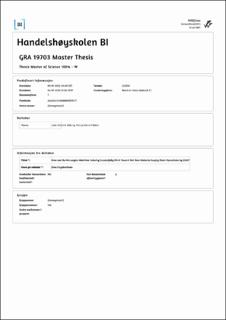| dc.description.abstract | The shipping sector plays a vital role in the Norwegian economy and significantly
contributes to international shipping. Norway's rich maritime heritage has
positioned the country favorably within the shipping industry. With the growing
emphasis on climate action and industries striving to reduce emissions and
mitigate greenhouse gases, the shipping sector shares a collective objective of
achieving as close to zero-emission as possible by 2050.
The purpose of this study is to explore strategies, opportunities and factors that
can facilitate the industry’s transition toward sustainability, considering the unique
strengths and resources of the Norwegian maritime sector. Therefore, the research
question is: How can the Norwegian maritime industry successfully work toward
zero-emission supply chain operations by 2050? To answer the research question
this master thesis used a qualitative research method with semi-structured
interviews. Following a review on relevant literature, empirical data was collected
by interviews with experts in the industry, which provided valuable insights into
the industry's perspectives, experiences, and challenges related to the emerging
market of zero-emission shipping. Additional information from climate and
sustainability reports was gathered to examine the current situation and evaluate
drivers, conditions and barriers in the market of zero-emission.
Our analysis of theoretical and empirical findings shows that collaboration
between stakeholders is crucial in developing a robust market and for the industry
to reach their goals by 2050. The market of zero-emission shipping needs supply
and demand equilibrium, leading to an increased pressure on the authorities to
engage and commit in the transition with leading players to ensure products and
services are effectively managed in the end. The lack of certainty and
development in the zero-emission market presents challenges for companies
operating in the maritime industry. However, the findings highlight the Norwegian
cluster's position as a frontrunner in innovation and the Norwegian cluster
showcases its commitment to achieving sustainability objectives while
concurrently driving economic growth. The Norwegian maritime sector has the
potential, by working closely with stakeholders in the market and leveraging the
driving forces, to overcome the barriers presented, to reach their goals by 2050. | en_US |
